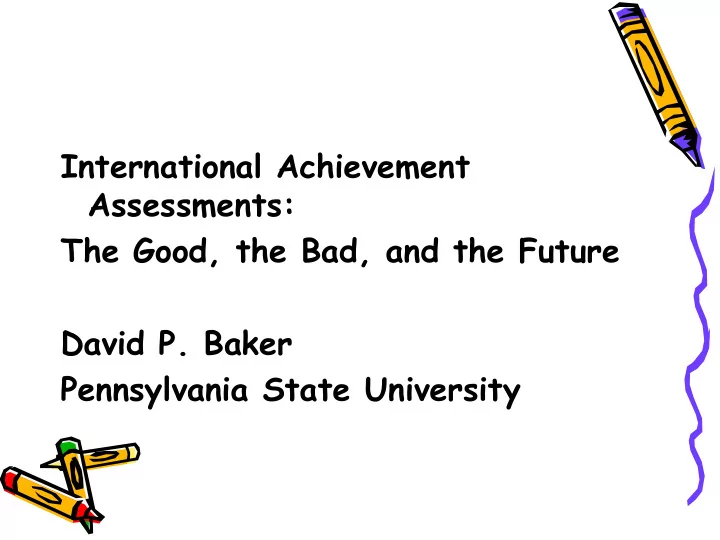

International Achievement Assessments: The Good, the Bad, and the Future David P. Baker Pennsylvania State University
Towards a Schooled Society Dimensions of the Worldwide Education Revolution
World Primary, Secondary, and Tertiary Students, 1815-2000. 700 600 500 illions) tudents (M 400 ber of S 300 Take off Num 200 1900 100 0 1800 1820 1840 1860 1880 1900 1920 1940 1960 1980 2000 Primary Secondary Tertiary
World Secondary and Tertiary Students, 1815-2000. 450 400 350 Number of Students (Millions) 300 250 200 Take-off 150 1945 100 50 0 1800 1820 1840 1860 1880 1900 1920 1940 1960 1980 2000 Secondary Tertiary
World Tertiary Students, 1815-2000. 100 90 80 Number of Students (Millions) 70 60 50 40 Take-off 30 1960 20 10 0 1800 1820 1840 1860 1880 1900 1920 1940 1960 1980 2000
• Teaching Methods: Germany, Japan, US, %var. among nations • Seatwork 0.6 • Individual Guidance 7.4 • Whole class 7.0 • Pair work 4.5 • Explain Reasoning 1.2 • Open-ended 7.2
Math is: Abstract 8.6 Real appls. 4.3 Natural Talent 2.4 Needs Practice 14.0 Important to: Like Students 3.0
100 80 60 Percentage of Students Participating Weekly 2 40 20 0 Nation Figure 1: Shadow Education Participation by Nation, Eighth Grade Mathematics 1 1: Mean = 37.6 % , SD = 21.3 % , N = 41 2: Any amount of participation.
International Civic Study 1999 Political Knowledge, Skill, Attitudes: . No influence of nation raised-in . Teacher effects..training . Open communication classroom
• Does curriculum matter for academic achievement? • Of course, but not cross-nationally • Why?
Rise in IQ, Wechsler Tests and Stanford-Binet, 1932-1992
Grades 1/2 1930
1966 Kindergarten Question: What figure should come next?
Grade 2 1991
Percent of countries with male advantage gender differences in 8th grade math by year of IEA study. 40% 35% 30% 25% 20% 15% 10% 5% 0% FIMS 1964 SIMS 1982 TIMSS 1995
Qualities of Regimes Do Not Influence Production of Effective Citizenry For example: Years of Democratic Government Level of Civil Liberties Number of Effective Political Parties Numerous other political characteristics
School and Schooling Qualities Do Influence the Production of Effective Citizenry For example: Democratic Classroom Politics and School Peers Educational Expectations Teacher w/Civic Experience Teacher w/Civic Training Civics Curriculum Available Civics Class Size
A Sample of What Most 14-yr Olds Stronger Believe about Politics and Society All citizens should be able to participate in Politics Men and Women should received same pay for same jobs Government should provide adequate standard of living fro elderly and unemployed People should have the right to freely elect political leaders Ethnic minorities should have access to same quality of education as everyone else
Recommend
More recommend